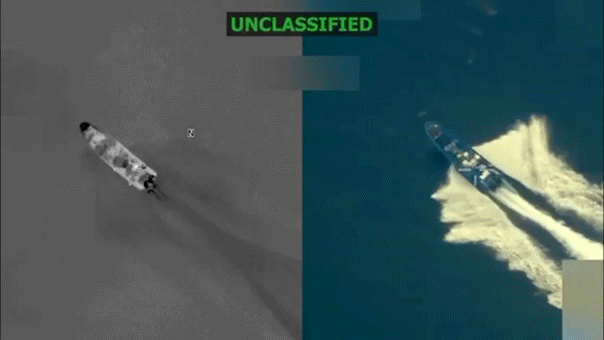Did Trump Just Take Down a Drug Trafficking Vessel and Eliminate 3 Narco-Terrorists?

Published: 2025-09-20 00:37:50 | Category: Trump GNEWS Search
In a bold move, former President Donald Trump announced a lethal military strike against a vessel linked to a designated terrorist organisation involved in drug trafficking. This operation, part of the U.S. Southern Command's ongoing efforts, reportedly resulted in the deaths of three individuals identified as narco-terrorists and aimed to combat the trafficking of illegal narcotics into the United States.
Last updated: 27 October 2023 (BST)
Key Takeaways
- Trump ordered a lethal strike on a vessel linked to a terrorist organisation involved in drug trafficking.
- The strike resulted in the deaths of three narco-terrorists without any harm to U.S. forces.
- This action is part of a broader crackdown on Venezuelan drug cartels.
- The U.S. military had previously targeted vessels associated with the Tren de Aragua cartel.
- Drug cartels like Tren de Aragua and the Sinaloa Cartel have been designated as foreign terrorist organisations.
Background on the Strike
On Friday, Trump announced via Truth Social that he had ordered a military strike targeting a vessel engaged in narco-trafficking, which was operating in the area of responsibility of U.S. Southern Command (USSOUTHCOM). This strategic operation, conducted in international waters, reflects ongoing U.S. efforts to dismantle drug trafficking routes that threaten public safety and national security.
Understanding Narco-Terrorism
Narco-terrorism is defined as the use of drug trafficking to further the objectives of terrorist organisations. This blurs the lines between organized crime and terrorism, as these groups often resort to violence to protect their interests and expand their operations. The Venezuelan government has been accused of harbouring such groups, leading to increased military actions from the U.S.
The Recent Military Actions
Earlier this month, U.S. military forces executed a strike in the Caribbean, targeting a vessel associated with the Tren de Aragua cartel, resulting in significant casualties among suspected narco-terrorists. This recent strike is the second such operation within a week, indicating a shift in U.S. military strategy towards a more aggressive stance against drug trafficking organisations operating out of Venezuela.
Implications of the Strike
The implications of these military actions are profound. Firstly, they signify a commitment from the U.S. to combat the influx of illicit drugs, particularly fentanyl, which has been a significant contributor to the opioid crisis in America. By targeting narco-terrorists directly, the U.S. is not only attempting to disrupt drug supply chains but also to send a strong message to other criminal organisations.
International Reactions
The response from the Venezuelan government has been swift and critical. President Nicolás Maduro condemned the strikes as a military threat against Venezuela, accusing the U.S. of violating international law. Such rhetoric is expected from the Venezuelan regime, which often frames external military actions as acts of aggression.
What Comes Next?
As the U.S. continues its military campaign against drug cartels, it raises questions about what this means for international relations with Venezuela. Increased military presence and operations in the region may lead to heightened tensions, but may also encourage cooperative efforts to combat drug trafficking at a multilateral level.
Current Status of Venezuelan Drug Cartels
Venezuelan drug cartels, particularly the Tren de Aragua, are increasingly viewed as significant threats not just to the U.S. but also to stability in the region. By designating these groups as foreign terrorist organisations, the U.S. opens up avenues for sanctions and further military actions. This designation is crucial in framing the battle against drug trafficking as not merely a law enforcement issue but a matter of national security.
Future Military Strategy
Looking ahead, it is likely that the U.S. will continue to escalate military operations against Venezuelan drug cartels. The Biden administration, while initially adopting a cautious approach, may benefit from the precedent set by Trump's recent actions. This could lead to a bipartisan agreement on the need for a tougher stance against narco-trafficking.
Conclusion
As the U.S. military gears up for more operations against narco-terrorists, the battle against drug trafficking is far from over. The recent strikes signify a renewed commitment to tackling the challenges posed by these organisations. Observers will be watching closely to see how these actions influence U.S.-Venezuela relations and the broader fight against drug-related violence. What strategies will emerge next in this ongoing struggle?
#NarcoTerrorism #USMilitary #DrugTrafficking
FAQs
What is narco-terrorism?
Narco-terrorism refers to the use of drug trafficking to support terrorist organisations. This often involves violence and intimidation to protect drug operations and further the group's objectives.
Why did the U.S. target the Venezuelan drug cartels?
The U.S. targeted Venezuelan drug cartels to combat the influx of illicit narcotics, particularly fentanyl, which has contributed to the opioid crisis in America, posing a significant threat to public health.
What was the outcome of the recent strikes?
The recent strikes led to the deaths of three narco-terrorists and were conducted without any harm to U.S. forces. They are part of a broader strategy to disrupt drug trafficking operations.
How does the U.S. classify these drug cartels?
The U.S. has designated certain drug cartels, such as Tren de Aragua and the Sinaloa Cartel, as foreign terrorist organisations, enabling it to impose sanctions and conduct military operations against them.
What are the potential consequences of these military actions?
These military actions may escalate tensions between the U.S. and Venezuela while also influencing regional stability and international cooperation on drug trafficking issues.



